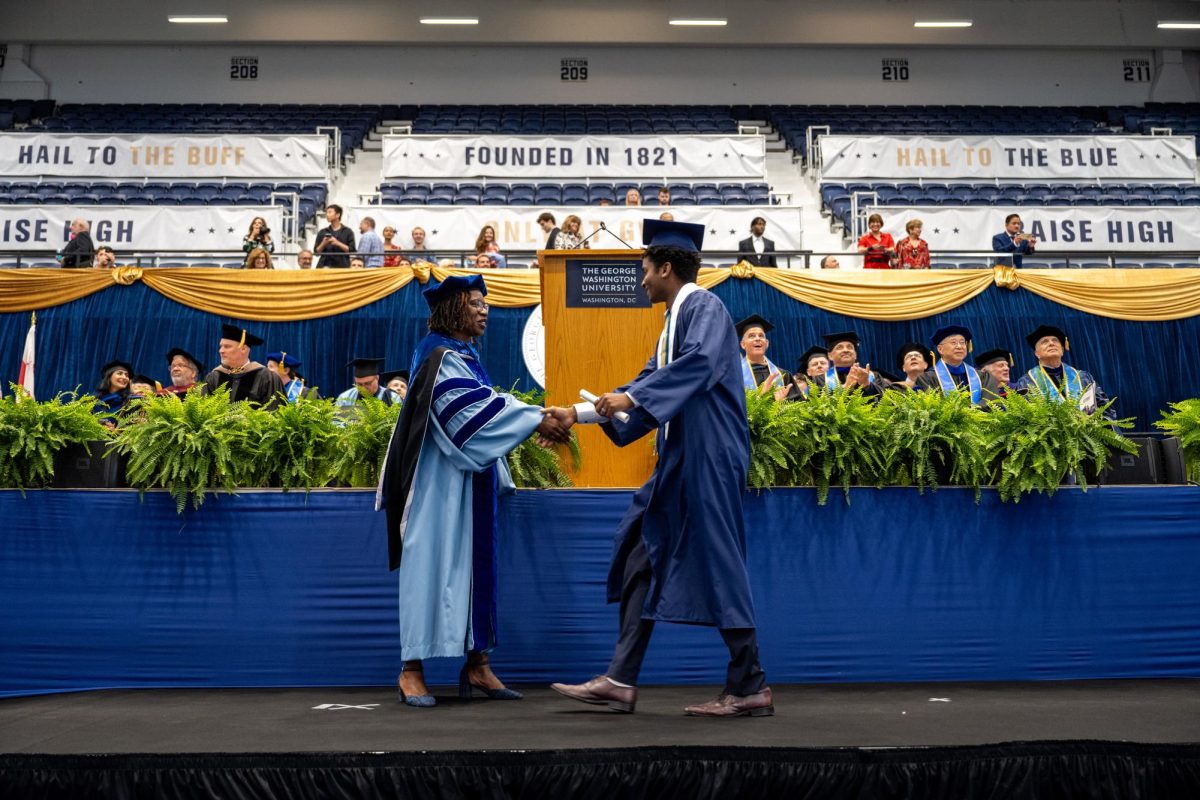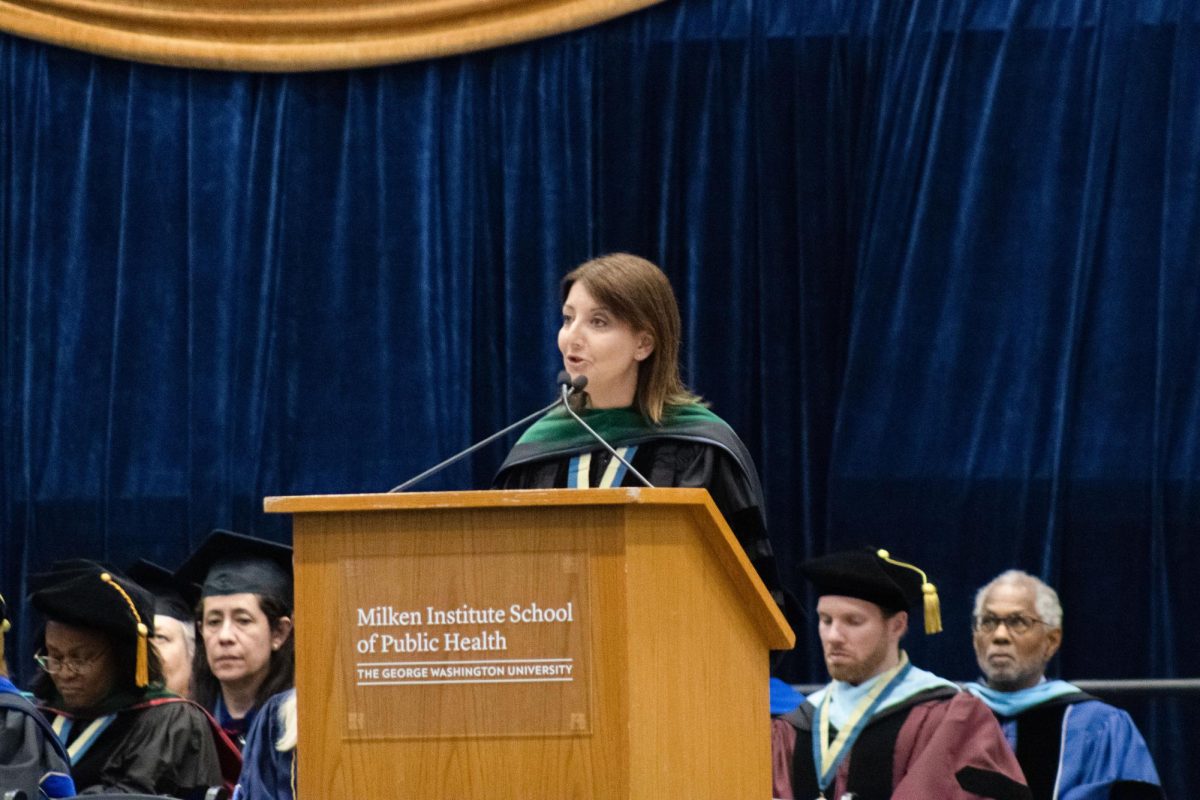GW shaved $6 million from its academic and administrative budget for the coming year and delayed faculty and staff pay raises to accommodate a drop in the University’s endowment and the weak economy. Cuts include an off-campus housing Web site and admissions materials among other items, as administrators attempted to slash programs which did not greatly affect student life.
The cuts come as the value of the University’s endowment fund has plummeted by $135 million since June 2001, causing GW to cut endowment spending by $5 million this year. Endowment is the dollar value of the money and property donated to an institution. Each year, the University earmarks funds from the endowment towards its budget.
GW officials blame a stagnating economy, triggered by a decline in the stock market, for the fund’s depreciation.
The endowment spending decrease comes on the heels of a 4.5 percent tuition hike for returning students and a 5.5 percent increase for incoming students. The tuition increase will not neutralize the drop in the endowment fund.
Although the undergraduate tuition hike and revenue from food and housing services accounts for 84 percent of the revenue increase the University will see this year – $27.6 million – most of that money will fund graduate programs.
About $500,000 will go to graduate student stipends, $700,000 will go to research projects and $3 million will go to the law school.
Gelman Library will receive an additional $350,000, while the Student Association’s budget will receive a $19,000 boost.
Johnnie Osborne, chief financial officer for Student and Academic Support Services, said GW is not short-changing any of its undergraduate programs.
“The dollar amount on a budget plan is often not a true indication of where funds are going,” he said. “We have initiatives spread across all the classes, not just the graduate programs.”
Osborne also defended the cuts in the face of a tuition increase, saying the “re-allocation” of funds would avert an even steeper tuition hike.
“The cost of keeping GW at a standard of academic excellence is great,” he said. “If we had not re-allocated funds in the way we did, we would have had to raise tuition even higher just to sustain the high quality of the academics at the University.”
“These cuts keep tuition from going higher,” he added.
SASS will cut spending by about 1.1 percent expenditures, including admissions, athletics, University Police and student activities.
“You can usually tell how near and dear a budget cut is to people by how much screaming and crying it generates,” said SASS Senior Vice President Robert Chernak. “No one was really wailing about these cuts, so I think we can live without those funds.”
The University tried to restrict the cuts to areas that would not have a great effect on student life, Chernak said.
For example, $45,000 was cut from the $4 million undergraduate admissions budget by printing 70,000 fewer brochures. The cut isn’t expected to hurt the University’s admission numbers. GW received a record 18,500 applications last year, up 9 percent from 2002.
“In some cases we might have to work a little bit harder and a bit more efficiently, but our key services are going to continue much as they did before,” Chernak said.
SASS began cutting back its budget during Colonial Inauguration by eliminating $30,000 in expenses.
Incoming freshmen and their families received fewer food options at CI, Chernak said. The University also saved money by eliminating the popular GWopoly board game.
One casualty of the budget cuts is GW’s off-campus housing Web site, which will be shut down because it received very few hits, Chernak said. Students used the site to browse listings of off-campus apartments or post advertisements to find roommates.
“The number of hits on the site was minimal and with the apartment market being what it is, it was never up-to-date to the extent that it was useful to anyone,” Chernak said. “We might have cut the site anyway, even if we hadn’t been
forced to.”
Some students were surprised to learn the site was closing.
Sophomore Mike Kassan said he used the Web site to find his current room in a Foggy Bottom townhouse.
“It seems like the University is alienating students who go off-campus,” Kassan said. “I guess they’d like to have us in dorms, paying room and board. Closing the Web site just makes things more difficult for the students.”
University officials considered scrapping the GW Reads Program in the spring, but ultimately kept it. Through the $80,000-a-year program, free copies of the New York Times, USA Today and the Washington Post are made available to students in residence hall lobbies. According to University statistics, only 30 percent of these papers were picked up each day. While scores of students lobbied for the program, Chernak said it was kept for other
reasons.
“The newspaper program is very germane to the philosophy of what we want people to be doing here: educating themselves and exposing themselves to different views,” Chernak said. “I think reading the newspaper is important to one’s education, so that got saved.”
$6.5 million budget by delaying maintenance on vehicles and waiting to purchase certain supplies. This excludes a funding increase for the 4-RIDE escort service, which has seen a sharp increase in usage.
GW administrators are also reluctant to hire new staff. Requests to fill a vacant or a new positions must now be approved by a vice president from that department.
Although faculty and staff will have to wait six months for their pay raises, all benefits – such as paid vacations and health coverage – will stay in place.
Osborne said it is too early to say the cutbacks will be permanent.
Officials pointed out while they are cutting back spending in certain areas, they are increasing funding to areas where there is a great demand for it.
The University will give an additional $8.9 million in financial aid because a nationwide recession has landed many students in economic turmoil.







